Entrave Study guides, Class notes & Summaries
Looking for the best study guides, study notes and summaries about Entrave? On this page you'll find 175 study documents about Entrave.
Page 4 out of 175 results
Sort by
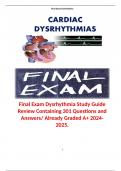
-
Final Exam Dysrhythmia Study Guide Review Containing 301 Questions and Answers/ Already Graded A+ 2024-2025. Terms like: First Degree Atrioventricular Heart Block - Answer: prolonged PR interval-measures the time required for an impulse to travel from the
- Exam (elaborations) • 62 pages • 2024
- Available in package deal
-
- $11.49
- + learn more
Final Exam Dysrhythmia Study Guide Review Containing 301 Questions and Answers/ Already Graded A+ . Terms like: First Degree Atrioventricular Heart Block - Answer: prolonged PR interval-measures the time required for an impulse to travel from the SA to the AV node. PRI longer than 0.20
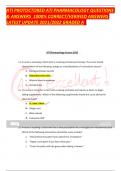
-
A nurse is assessing a client who is receiving intravenous therapy. The nurse should identify which of the following ;ndings as a manifestation of =uid volume excess? a. Decreased bowel sounds b. Distended neck veins c. Bilateral muscle weakness d.
- Exam (elaborations) • 96 pages • 2023
-
- $20.99
- + learn more
A nurse is assessing a client who is receiving intravenous therapy. The nurse should identify which of the following ;ndings as a manifestation of =uid volume excess? a. Decreased bowel sounds b. Distended neck veins c. Bilateral muscle weakness d. Thread pulse 2.) .) A nurse is caring for a client who is taking sertraline and reports a desire to begin taking supplements. Which of the following supplements should the nurse advise the client to avoid? a. St. John’s Wort b. Gin...
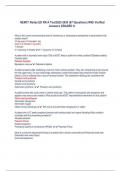
-
NEW!!! Relias ED RN A Test2023-2024 (67 Questions) With Verified Answers GRADED A What is the current recommended dose of intravenous or intraosseous epinephrine in adult patients with cardiac arrest? 10 mg every 10 minutes 1 mg every 3-5 minutes 1 mg eve
- Exam (elaborations) • 20 pages • 2023
-
- $17.99
- + learn more
NEW!!! Relias ED RN A Test (67 Questions) With Verified Answers GRADED A What is the current recommended dose of intravenous or intraosseous epinephrine in adult patients with cardiac arrest? 10 mg every 10 minutes 1 mg every 3-5 minutes 1 mg every 7 minutes 0.1 mg every 2 minutes 1 mg every 3-5 minutes A patient with a traumatic brain injury (TBI) is MOST likely to suffer from what condition? Diabetes mellitus Cerebral palsy Diabetes Insipidus Myxedema coma Diabetes Insipidus A patient pre...
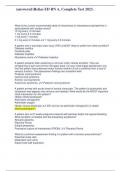
-
(answered)Relias ED RN A, Complete Test 2023. What is the current recommended dose of intravenous or intraosseous epinephrine in adult patients with cardiac arrest? 10 mg every 10 minutes 1 mg every 3-5 minutes 1 mg every 7 minutes 0.1 mg every 2 minutes
- Exam (elaborations) • 22 pages • 2023
-
- $27.99
- + learn more
(answered)Relias ED RN A, Complete Test 2023. What is the current recommended dose of intravenous or intraosseous epinephrine in adult patients with cardiac arrest? 10 mg every 10 minutes 1 mg every 3-5 minutes 1 mg every 7 minutes 0.1 mg every 2 minutes 1 mg every 3-5 minutes A patient with a traumatic brain injury (TBI) is MOST likely to suffer from what condition? Diabetes mellitus Cerebral palsy Diabetes Insipidus Myxedema coma Diabetes Insipidus A patient presents after sustaining a roll...
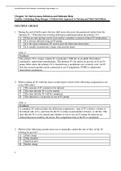
-
Chapter 14: Intravenous Infusion and Infusion Rate- Castillo: Calculating Drug Dosages: A Patient-Safe Approach to Nursing and Math 2nd Edition Test Question and answers for Chapter 14
- Exam (elaborations) • 8 pages • 2023
- Available in package deal
-
- $17.99
- + learn more
Chapter 14: Intravenous Infusion and Infusion Rate- Castillo: Calculating Drug Dosages: A Patient-Safe Approach to Nursing and Math 2nd Edition Test Question and answers for Chapter 14
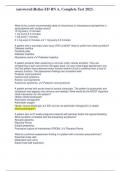
-
Relias ED RN A, Complete Test Fall 2023 What is the current recommended dose of intravenous or intraosseous epinephrine in adult patients with cardiac arrest? 10 mg every 10 minutes 1 mg every 3-5 minutes 1 mg every 7 minutes 0.1 mg every 2 minutes A pati
- Exam (elaborations) • 22 pages • 2023
- Available in package deal
-
- $15.99
- + learn more
Relias ED RN A, Complete Test Fall 2023 What is the current recommended dose of intravenous or intraosseous epinephrine in adult patients with cardiac arrest? 10 mg every 10 minutes 1 mg every 3-5 minutes 1 mg every 7 minutes 0.1 mg every 2 minutes A patient with a traumatic brain injury (TBI) is MOST likely to suffer from what condition? Diabetes mellitus Cerebral palsy Diabetes Insipidus Myxedema coma A patient presents after sustaining a roll-over motor vehicle accident. They are complaining ...

-
Summary I’ve given you all the different questions that ATI Pharm 2019 has had on the exam. All the answers are correct. good luck. Pharmacology 2019 ATI Pharmacology Proctor 2019 1.) A nurse is assessing a client who is receiving intravenous therapy
- Exam (elaborations) • 71 pages • 2023
-
- $10.99
- + learn more
Summary I’ve given you all the different questions that ATI Pharm 2019 has had on the exam. All the answers are correct. good luck. Pharmacology 2019 ATI Pharmacology Proctor 2019 1.) A nurse is assessing a client who is receiving intravenous therapy. The nurse should identify which of the following ;ndings as a manifestation of =uid volume excess? a. Decreased bowel sounds b. Distended neck veins c. Bilateral muscle weakness d. Thread pulse 2.) A nurse is caring for a c...
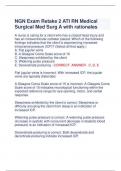
-
NGN Exam Retake 2 ATI RN Medical Surgical Med Surg A with rationales A nurse is caring for a client who has a closed head injury and has an intraventricular catheter placed. Which of the following findings indicates that the client is experiencing in
- Exam (elaborations) • 42 pages • 2024
-
- $11.29
- + learn more
NGN Exam Retake 2 ATI RN Medical Surgical Med Surg A with rationales A nurse is caring for a client who has a closed head injury and has an intraventricular catheter placed. Which of the following findings indicates that the client is experiencing increased intracranial pressure (ICP)? (Select all that apply.) A. Flat jugular veins B. A Glasgow Coma Scale score of 15 C. Sleepiness exhibited by the client D. Widening pulse pressure E. Decerebrate posturing - CORRECT ANSWER C, D, E ...
Chapter 7 "Nursing Care of Patients Receiving Intravenous Therapy"
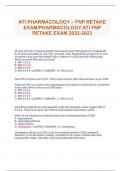
-
ATI Pharmacology Proctor 2019/exam updated A nurse is assessing a client who is receiving intravenous therapy. The nurse should identify which of the following findings as a manifestation of fluid volume excess? a. Decreased bowel sounds b. Distended neck
- Exam (elaborations) • 29 pages • 2023
-
- $27.99
- + learn more
ATI Pharmacology Proctor 2019/exam updated A nurse is assessing a client who is receiving intravenous therapy. The nurse should identify which of the following findings as a manifestation of fluid volume excess? a. Decreased bowel sounds b. Distended neck veins c. Bilateral muscle weakness d. Thread pulse b. Distended neck veins A nurse is caring for a client who has hyponatremia and is receiving an infusion of a prescribed hypertonic solution. Which of the following findings should indicate ...

Study stress? For sellers on Stuvia, these are actually golden times. KA-CHING! Earn from your study resources too and start uploading now. Discover all about earning on Stuvia



